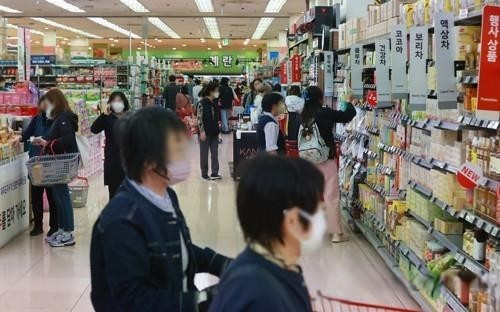 |
This file photo shows people shopping for groceries at a discount store in Seoul on April 13. (Yonhap) |
South Korea's consumer prices grew at the slowest pace in more than a year in April on falling global oil prices, data showed Tuesday, in the latest signal that inflation has receded.
Consumer prices, a key gauge of inflation, rose 3.7 percent last month from a year earlier, compared with a 4.2 percent on-year rise in March, according to the report from Statistics Korea.
It is the first time in 14 months that the on-year inflation growth fell below 4 percent. The figure rose to over the 4 percent level in March last year from a 3.7 percent growth the previous month and jumped to as high as 6.3 percent in July before showing the overall downward trend.
In April, the Bank of Korea held the benchmark interest rate steady for the second straight time at 3.5 percent on easing inflationary pressure and concerns about an economic downturn after seven straight hikes.
Inflation stayed above 2 percent -- the central bank's inflation target over the medium term -- for the 25th straight month in April.
April's slowdown came on falling global oil prices.
Prices of petroleum products fell 16.4 percent on-year, marking the sharpest decline since May 2020. South Korea depends mainly on imports for its energy needs.
Prices of Dubai crude, South Korea's benchmark, stood at $83.44 per barrel on average in April, down nearly 20 percent on-year.
The prices of agricultural, fisheries, and livestock products rose 1 percent on-year in March, from a 3 percent growth tallied a month earlier.
Those of utility services climbed 23.7 percent on-year in April, slowing from a 28.4 percent jump the previous month.
Prices of personal services, however, grew at a faster clip of 6.1 percent on-year last month than March, when the figure came to 5.8 percent, due to higher costs for dining out, as well as insurance and housing management costs.
Core inflation, which excludes volatile food and oil prices, rose 4.6 percent on-year last month, compared with a 4.8 percent growth in March.
Prices of daily necessities -- 141 items closely related to people's daily lives, such as food, clothing and housing -- advanced 3.7 percent last month, slowing from a 4.4 percent growth in March.
"Given a high base effect, prices are expected to stabilize further in the second half of this year, but uncertainties remain regarding global oil prices, potential hikes in gas and electricity rates, and the won-dollar exchange rates," a statistics agency official said. (Yonhap)







